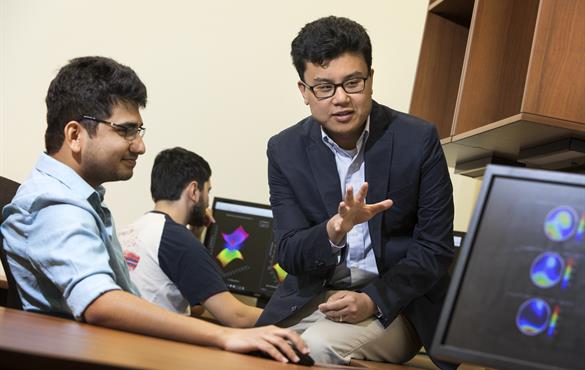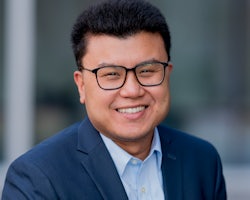How is the brain controlled? WashU engineer seeks answers
ShiNung Ching will take a systematic look at cognitive functions of the brain with a five-year, $500,000 CAREER Award from the National Science Foundation

ShiNung Ching earns 2017 NSF CAREER Award
Engineers are able to look a system, such as an airplane, and by analyzing its physical characteristics predict how easily it is to control, such as how well it steers, how fast it can go or how many maneuvers it can do. Now, an engineer at Washington University in St. Louis wants to apply that same theory to the human brain.
ShiNung Ching, the Das Family Career Development Distinguished Assistant Professor of Electrical & Systems Engineering in the School of Engineering & Applied Science, will take this systematic look at cognitive functions of the brain with a five-year, $500,000 CAREER Award from the National Science Foundation. The awards support junior faculty who model the role of teacher-scholar through outstanding research, excellent education and the integration of education and research within the context of the mission of their organization. One-third of current Engineering faculty have received the award.
"We will use a systems approach to study whether certain cognitive functions are predicted by properties of the brain's neural circuits that we can elucidate through dynamical systems and control theoretic approaches," said Ching, whose project is titled "System Theoretic Methods for Understanding the Dynamics of Cognition." "In a general sense, we are asking how easily different circuits in the brain steer each other, or how pliable they are. We're not designing brain circuits and networks as we do with electrical and mechanical systems, but they have physical properties and dynamics just like any other system does, so we can try to develop the same understanding."
Engineers and researchers have been studying brain networks for decades and have learned that there are sub-networks in the brain that are responsible for certain tasks, such as attention, memory and sensory information processing. The National Academy of Engineering has made reverse-engineering the brain one of its Grand Challenges for the 21st century.
"The hypothesis is that there is a link between specific cognitive functions and the dynamics and control properties of these networks," he said. "We're trying to equip ourselves with the tools to be able to make those links in more precise, rigorous ways."
The project builds on Ching's ongoing research in brain networks. In ongoing NSF-funded research, Ching is developing and analyzing mathematical models of brain networks to investigate how particular features of the networks may enable processing of information, such as sounds and visual cues from the environment. With collaborator Jr-Shin Li, the Das Family Career Development Distinguished Associate Professor of electrical & systems engineering, Ching is working on methods to get a specific reaction from particular cells in the brain as part of the National Institutes of Health's (NIH) Brain Research through Advancing Innovating Neurotechnologies (BRAIN) Initiative, a large-scale investment launched by former President Barack Obama in 2013 to equip researchers with insights necessary to treat a wide array of brain disorders.
In research also funded by the NIH, Ching also is working with Terrance Kummer, MD, assistant professor of neurology in the School of Medicine, developing a new method that will help them determine the state of the brain in patients in a coma and has the potential to lead to new treatments.
Ching joined the School of Engineering & Applied Science faculty in 2013 from Harvard Medical School-Massachusetts General Hospital and the Massachusetts Institute of Technology, where he was a postdoctoral research fellow. He earned a doctorate from the University of Michigan, a master's degree from the University of Toronto, and a bachelor's degree from McGill University in Montreal.
In 2012, Ching received a Burroughs-Wellcome Fund Career Award at the Scientific Interface. This award is granted to early career researchers with backgrounds in engineering and the applied sciences, who are using methodologies from these fields to pursue research questions of biological and medical relevance. In addition to writing published articles in both engineering and basic science journals, Ching is the lead author of the textbook "Quasilinear Control," published by Cambridge University Press in 2011.




